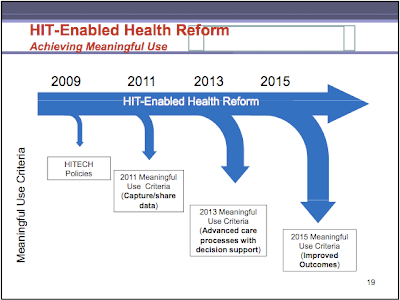
To which I replied:
Paul, I'd like to see a model considered where the patient owns the data, and licenses it out to others, such as doctors, hospitals, and insurance companies. One could then imagine a situation where that data (including their genetic info), owned and licensed by the patient, might have a value. The patient could then do the following:
- be paid licensing fees for access to their data (from Google or other marketing companies; and from insurance companies and Pharma, who would benefit from knowing this info)
- grant access for free to their providers, spouse, etc
- pay others to access their data in order to gain some benefit, such as analytics
This would change the whole discussion about health care, privacy, and costs.
Think about the incredible shifts and changes in the marketplace if such a revolution developed.
Not only would there be this "power to the people" shift in mindset, it would also create a huge change in the average consumer's approach to their own health. It would encourage them to pay attention to their data, and thus their health, in a manner similar to how people pay attention to their savings and checking accounts. It might even result in a reduction in health care costs. It would certainly create a more fluid marketplace.
How do we get there? (add comments/ideas)
- HealthBlawg: David Harlow's interview with law professor Marc Rodwin about idea of public ownership of de-identified health data. [Jul 2009]
- Marc Rodwin's JAMA article, "The Case for Public Ownership of Patient Data". [Jul 2009]
- Silona Bonewald's post about mutual data ownership. [Jun 2009]
- Leo Kish asks: What if all applications, caregivers and patients were connected online? [Nov 2009]
- Gregg Masters (@2healthguru) posts "I Will License or Lease My Health Info to Providers". [Mar 2009]
- Steve Holcombe's piece on granular information ownership. [Aug 2008]


